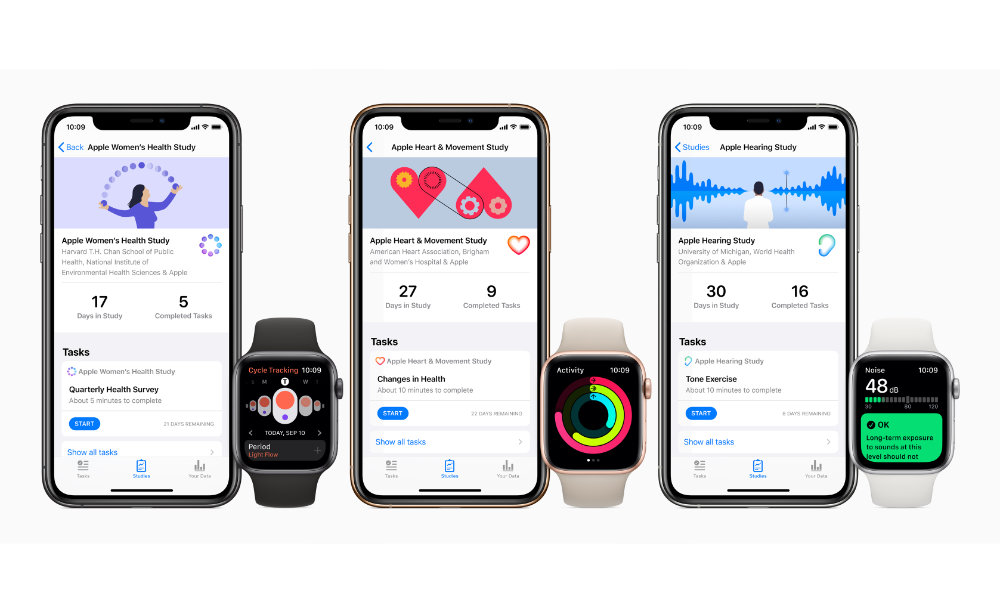Apple Invites Apple Watch Users to Participate in Three New Health Studies
 Credit: Apple
Credit: Apple
Toggle Dark Mode
Considering all of the shiny new Apple hardware that debuted at the company’s event in September — we got the iPhone 11 and iPhone 11 Pro along with the Apple Watch Series 5 — we can understand if you missed the part where Apple mentioned it would be releasing a new “Research” app to invite users to participate in three new health studies.
The announcement itself was tucked into the debut of the Apple Watch Series 5 and watchOS 6, which also brought Apple’s new Noise and Cycle Tracking apps along with it. These new user-facing apps were designed to help users protect their hearing and help women track their menstrual cycles directly, but also form part of three new health initiatives that Apple is undertaking in partnership with leading medical institutions.
Today Apple has actually opened the doors to these new studies with the launch of its new Research app. Users in the United States will now be able to sign up and participate in the Apple Women’s Health Study, The Apple Heart and Movement Study, and The Apple Hearing Study.
The Studies
The three studies are all being done in partnership with key medical institutions that specialize in each of these areas.
The Apple Women’s Health Study is intended to increase the understanding of menstrual cycles and how they relate to women’s health. It’s noteworthy for being the first long-term study of its kind, and hopes to try and correlate the relationship of menstrual cycles to various women’s health conditions, including polycystic ovary syndrome (PCOS), infertility, osteoporosis, and menopausal transition. The Women’s Health Study is being conducted in partnership with Harvard T.H. Chan School of Public Health and the NIH’s National Institute of Environmental Health Scienes (NIEHS). Participants will be asked to use their iPhone and Apple Watch to record cycle tracking information and complete monthly surveys concerning their menstrual experiences.
The Apple Heart and Movement Study aims to measure the relationship between a person’s movement and their current and future health status, particularly regarding heart health and deterioration in mobility. It’s a broad study of a wide array of factors related to promoting healthy movement and improved cardiovascular health, being sponsored by Brigham and Women’s Hospital and the American Heart Association. Participants will use their Apple Watch to record workouts that will be analyzed to help discover potential early warning signs of atrial fibrillation (AFib), heart disease, or declining mobility.
The Apple Hearing Study, powered by Apple’s new Noise app, will measure how sound exposure affects hearing health and stress levels over time — something that Apple notes is not really understood all that well. This study will collect data both on headphone usage and exposure to everyday external sounds using the Noise app on the Apple Watch, which will be analyzed by researchers from the University of Michigan to see how it relates to things like stress levels and cardiovascular health. The study will also try to assess whether notifications of loud sound exposure will encourage users to modify their listening behaviours. Apple notes that data will also be shared with the World Health Organization (WHO)’s “Make Listening Safe” initiative to help with programs that promote awareness of safe listening and reduce hearing loss.
How to Participate
Apple’s new research studies are currently only available to users in the United States. If you want to participate, simply download the Research app from the App Store, which will walk you through the sign-up process and let you know if you’re eligible to participate. Applicants for the Apple Women’s Health Study obviously need to be women, while the other two studies require an appropriate model of Apple Watch — a series 1 or newer for the Heart and Movement Study, and a Series 4 or Series 5 for the Hearing Study.
Naturally, Apple emphasizes that the Research app has been designed with privacy in mind, and was “carefully created to only share data with the chosen studies which the user approves” and offer a clear and detailed explanation of exactly what that entails, with options for the user to control the type of data that’s shared with each study.






